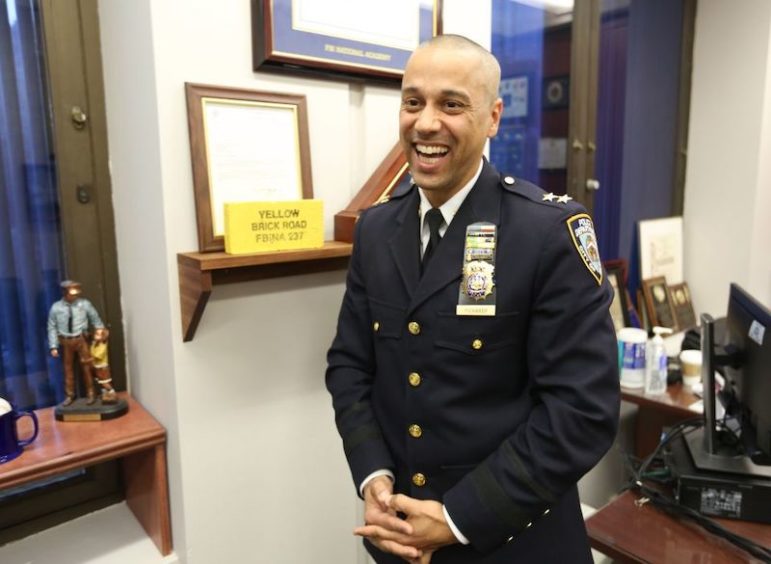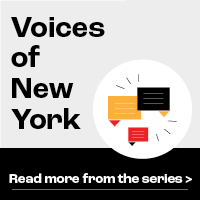He was seen as a pioneer and possible future commissioner in an agency where Latinos comprise an increasingly large part of the ranks.

This story originally appeared in El Diario.
Translated and condensed by Carlos Rodriguez
Last Wednesday saw the unexpected resignation of Fausto Pichardo, the highest-ranking Latino officer in the New York Police Department (NYPD).
As a Chief of Patrol, Pichardo still oversees more than 22,000 officers and 77 police precincts during one of the most turbulent times the Big Apple has endured in modern history with the convergence of a pandemic, racial justice protests and controversial police reform.
Pichardo, 43, was born in the Dominican Republic and migrated to the New York when he was nine years old. According to some of his Lower Manhattan neighbors, he was “well respected” from a young age for representing the ideals of self-improvement that characterize families who come into this country looking for a better life.

“He sets a powerful example for our youths. If you want to get on the right path, this city gives you opportunities,” said Feliz Rosario, 68, also Dominican, who saw Pichardo grow up in the Lower East Side. Years later, Rosario was said to have been surprised to see him on TV turned into a “great police officer.”
The first New Yorker of Caribbean origin named Chief of Patrol, Pichardo took the position in December. After having joined the department in 1997 and being promoted to different positions in an apparently unstoppable career, he unexpectedly requested to retire.
The reactions have flooded in. Raysa Gálvez, president of the NYPD’s Dominican Officers Association, described Pichardo as a Hispanic man who will always be an inspiration and a positive influence for new generations in the police force, adding that he played a key role in creating bridges between the police and ethnic minorities in the city.
“This is a great loss,” said Galvez. “Ever since he came to the institution as a cadet in 1997, he stood out for his talent, kindness and high marks. Today, he is a model for thousands of aspiring officers who are taking tests to work in the NYPD. We hope that the commissioner will continue to consider Latino officers, who are now well prepared to occupy high-ranking positions. The NYPD must strive for diversity at this time.”
In a press release, the Latino Officers Association also called to acknowledge the contributions of Latino leadership to law enforcement agencies.
“During these critical times, our priority is for the mayor and the police commissioner to recognize the need to protect Hispanic representation in policy-making positions,” said Anthony Miranda, executive director of the association.
Police Commissioner Dermot Shea said he was “surprised” by Pichardo’s resignation.
“He is a great asset to the department. He has really stood out in every one of the positions he has occupied. He will be missed,” said Shea, who declined to comment on the ongoing rumors that the Dominican-born officer stepped down after a tense exchange with Mayor Bill de Blasio.
In the halls of One Police Plaza, the department’s headquarters, and in the city’s precincts, the resignation also came as a shock.
“He is a dynamo 24/7. Precisely because he belongs to an immigrant family, he understands every millimeter of the city. He is a professional police officer and has a contagious discipline. At the department, we used to see him as a future commissioner. He is not the only valuable loss we have had, but it’s the most visible one,” an NYPD source told El Diario.
Indeed, thousands of New York City officers have retired in the last four months. From May 25 to September 10, the number of officers who filed their paperwork to leave the force increased to 1,189, compared to 679 during the same period in 2019, according to NYPD statistics. That’s a 75 percent increase.
“This anti-police climate and the budget cuts, and hearing politicians shooting down the entire institution day and night, they are doing terrible harm to New York City. This judgment will leave you without valuable professionals or youths coming from our neighborhoods, like Officer Pichardo, who love and respect the uniform,” said another official who chose to remain anonymous.
Back in December, Pichardo’s appointment as highest-ranked seat at the Patrol Services Bureau was considered progress for Latino officers, who occupy fewer than 10 percent of the top positions in the department.
Particularly in the last five years, Hispanics constitute more than 35 percent of graduates at the NYPD Police Academy. Most of them are of Dominican descent.
De Blasio categorically denied last week that the reason for Pichardo’s resignation had to do with discrepancies or “disagreements” with his administration. He added that he spoke with the officer a number of times on the evening of his resignation and again the next morning.
“I am very clear […] this was a personal decision, a decision based on personal and family factors. He is a very devoted family man. This was something he felt was important to do for his family,” said the mayor in response to the stream of rumors that linked Pichardo’s resignation with the mayor’s interference in police leadership affairs.








